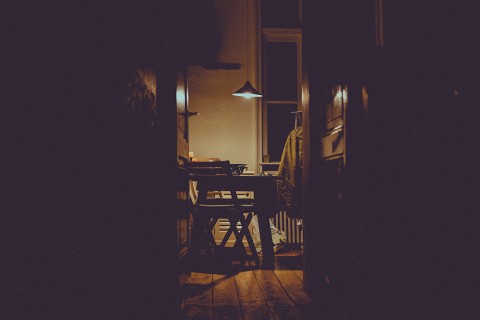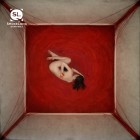My brother sends a newspaper clipping and a scrawled note: Don’t worry, this was just for a couple days. The black-and-white photo features him grinning in a suit and tie, standing beside a tent with a posterboard sign that reads THE END IS NEAR.
“My friends let me set up in front of their house,” he says when I call later that night. “They thought it was hilarious. But I found another job and a new apartment, so don’t worry.”
“I’m not worried,” I say, though I’ve never pegged my brother for a doomsday prophet. He’s sweet, thoughtful, occasionally melancholy, and has a sense of humor that people might not understand if they didn’t grow up with him. He says he needed something to do after he lost his delivery job at the pizza place—he doesn’t explain why that happened—but he has a new gig at a coffee shop, gets free espresso shots, and his boss isn’t an asshole.
“Great,” I say. I don’t tell him that our mom lost her job due to “excessive” absences from work. She’s supposed to be able to work from home when she has a migraine or when her back hurts too much to move.
“Predicting Armageddon was kind of fun,” my brother says. “People stopped by to talk and take my picture, and Ginny helped me make those great signs.” Ginny is his girlfriend and an art major who’s tidier and more bookish than my brother.
Mom says, “They didn’t break up, did they?” She’s sitting across from me at the kitchen table, filling out forms to apply for disability benefits. She’s been calmer than me since she lost her job, but that’s usually the case.
“He’s working as a barista,” I tell Mom.
“That’s not bad,” says Mom.
“My friends have a great mailman,” says my brother. “He stopped to chat every day, and he had white hair and a mustache like that postman on Mr. Rogers. He liked my ties. I told him you gave them to me.”
“Tell him not to drink too much caffeine after four,” says Mom. She should have applied for disability fifteen years ago after the car accident messed up her back, and ten years ago after she fell in an icy parking lot and hit her head. The migraines she’d been having got worse. I’m pretty sure it was a concussion, but she didn’t want to go to the doctor.
“Ginny was great,” says my brother. “She brought me sandwiches between classes, and she knows the guy who took my picture for the paper. I guess it was a slow day, because he had me smile and frown and turn my head a little to the right. It was like modeling.”
“It’s a good picture,” I say. The utility and phone bills arrived in the mail along with my brother’s photo. Mom says not to worry, we’ll make ends meet, but my book shelving job at the library doesn’t pay much, and it’s boring as hell though the people are nice. I want to go back for my Master’s in library science, but application fees are expensive, and I’d probably move to another city and leave Mom with her back pain and migraines and month-to-month existence–
“How are you guys?” my brother asks.
“Getting along,” I say. “It’s not the end of the world.”
That’s what Mom has been telling me for the past four days. If my brother knew she was unemployed, he’d skip out on the new job and drive two hours here, but we can’t do much but paperwork. I guess someone’s world is always ending, we just don’t often tell people about it. We buy more tissues, maybe some ice cream or chocolate, and use them to muffle the tiny explosions in our heads.
“Everything will work out,” Mom says without looking up at me.
“I can get coffee for cheap,” says my brother. “You want a dark, medium, or light roast?”
“I don’t know if we should buy more coffee if the world is ending,” I say.
“Nah,” he says. “It’s been rescheduled.”
My mother fills in scan-tron circles and bites her lower lip.
I walk back to the kitchen sink and dump the last four swallows of cold coffee from my mug. There’s more coffee in the pot, it might still be warm, but I don’t want another cup.


